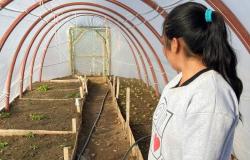By Irene Escudero |
Quibdó/Istmina (Colombia) (EFE).- Pacha Pasmo has attended 8,000 births and no baby has died in its hands. She receives more births in her ‘niche’, a consultation room adjacent to her house, than in the health center of Istmina, a bustling town in Chocó, in the Pacific of Colombia, where midwifery is a guarantor of life for the women.
“By a miracle this is empty,” says Daira Vanesa upon arriving at Pacha’s ‘niche’ from Sipí, a community an hour and a half away by river.
She arrived three days ago because in a previous pregnancy she waited until the end to go to the hospital and her water broke in a boat and she gave birth alone in the downpour.
“It’s one centimeter dilated… it stopped at night,” Pacha explains after inspecting it.
World Heritage
Francisca Córdoba, ‘Pacha Pasmo’, was previously afraid of blood and attended births with her eyes closed, but her fascination with “receiving pelaos” (children) ended her cold sweats and nerves.
“Midwifery is not made, midwifery is born; It is something that one carries in one’s blood, one would like to be attending births at all hours,” he tells EFE.
The ancestral midwifery of Afro and indigenous communities is cultural heritage of Colombia and since last year also a World Heritage Site by UNESCO. In Chocó, according to the Association of Midwives of this department (Asoredipar), there are 1,500 midwives and midwives.
“It is a legacy that is transmitted to daughters and granddaughters, which seeks to integrate traditional knowledge with Western knowledge but always wanting to preserve the life of the child and the woman,” the president of Asoredipar, Manuela Mosquera, explains to EFE.
Midwifery is necessary in the Pacific of Colombia because the lack of roads, state apathy and armed violence deprive the population of doctors and health centers.
“Midwives do this work without waiting for why or for whom, they are always willing to help, to preserve a life (…) It is a humanitarian service,” says Mosquera.
Ancestral knowledge in midwifery in Colombia
Domitila Menas, almost 70 years old, still lights up when she mentions the babies she has brought into the world. None of the 180 that she has attended to have died either.
“No one taught me,” she says proudly, sitting on the banks of the Atrato River; She learned by giving birth to her first daughter alone in 1975. ‘Mamá Domitila’ had 19 pregnancies and 26 children, adding to the almost 200 that she has helped give birth to.

“The midwives end up being the godmothers of the children they care for (…) they are a second mother,” explains Mosquera.
They accompany during pregnancy, they care for the mother after delivery and the baby in its first months, they even say that they shape the body and can flatten the head or make the baby’s buttocks larger with their hands.
And they don’t charge. In a population beset by hunger, there is nothing to pay with and they receive the will or try to get something for the concoctions of natural herbs and medicines that they prepare.
Blind, deaf, mute
Domitila knows that a woman is pregnant when she sees her change the foot she walks with, but she keeps it quiet. She also knows if a fetus is okay by touching the base of her mother’s neck with two fingers. Therefore, she knows that Nancy is not two months old and is not 17 years old. She is her neighbor and she knows that the girl, six months pregnant, is only 14 years old.
“You have to stop drinking alcohol because if it hurts, it’s because of the drink,” he reproaches this indigenous girl.

Midwives know the reality of their communities, where teenage pregnancies are daily and violence and poverty suffocate mothers. But they are silent.
“Our symbol in midwifery, in ethics, is Shakira: Blind, deaf, mute. What we see we don’t have to comment on, what we hear we don’t have to take out,” adds Manuela.
Hand in hand with medicine
They know that childbirth is sometimes life or death, which is why they urge mothers to go for check-ups at the hospital, they do not attend when they see signs of risk and they even accompany the mother to the medical center.
That is the formula for low mortality, despite the stigma they carry due to maternal mortality.
“When a child dies in a hospital, what happened? They killed him? Because as always when a child dies in the hands of a midwife it is because we killed him,” Pacha accuses.
For this midwife, the most important thing is “people’s lives, that children are saved,” and that is what they defend with their hands, their knowledge and their knowledge.









